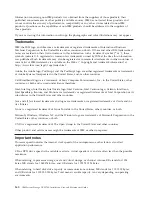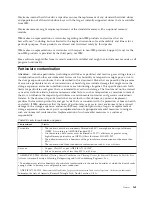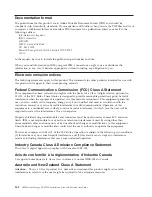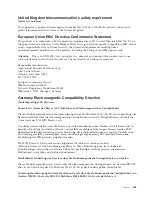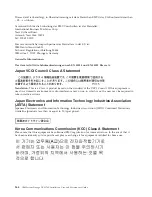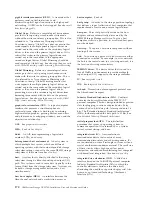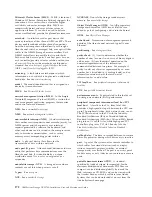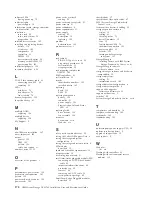
premium feature key.
A file that the storage
subsystem controller uses to enable an authorized
premium feature. The file contains the feature enable
identifier of the storage subsystem for which the
premium feature is authorized, and data about the
premium feature. See also
feature enable identifier
.
private loop.
A freestanding arbitrated loop with no
fabric attachment. See also
arbitrated loop
.
program temporary fix (PTF).
A temporary solution
or bypass of a problem diagnosed by IBM in a current
unaltered release of the program.
PTF.
See
program temporary fix
.
RAID.
See
redundant array of independent disks (RAID)
.
RAID level.
An array's RAID level is a number that
refers to the method used to achieve redundancy and
fault tolerance in the array. See also
array, redundant
array of independent disks (RAID)
.
RAID set.
See
array
.
RAM.
See
random-access memory
.
random-access memory (RAM).
A temporary storage
location in which the central processing unit (CPU)
stores and executes its processes. Contrast with
DASD
.
RDAC.
See
redundant disk array controller
.
read-only memory (ROM).
Memory in which stored
data cannot be changed by the user except under
special conditions.
recoverable virtual shared disk (RVSD).
A virtual
shared disk on a server node configured to provide
continuous access to data and file systems in a cluster.
redundant array of independent disks (RAID).
A
collection of disk drives (
array
) that appears as a single
volume to the server, which is fault tolerant through an
assigned method of data striping, mirroring, or parity
checking. Each array is assigned a RAID level, which is
a specific number that refers to the method used to
achieve redundancy and fault tolerance. See also
array,
parity check, mirroring, RAID level, striping
.
redundant disk array controller (RDAC).
(1) In
hardware, a redundant set of controllers (either
active/passive or active/active). (2) In software, a layer
that manages the input/output (I/O) through the
active controller during normal operation and
transparently reroutes I/Os to the other controller in
the redundant set if a controller or I/O path fails.
remote mirroring.
Online, real-time replication of data
between storage subsystems that are maintained on
separate media. The Enhanced Remote Mirror Option is
a DS5000 premium feature that provides support for
remote mirroring. See also
Global Mirroring
,
Metro
Mirroring
.
ROM.
See
read-only memory
.
router.
A computer that determines the path of
network traffic flow. The path selection is made from
several paths based on information obtained from
specific protocols, algorithms that attempt to identify
the shortest or best path, and other criteria such as
metrics or protocol-specific destination addresses.
RVSD.
See
recoverable virtual shared disk
.
SAI.
See
Storage Array Identifier
.
SA Identifier.
See
Storage Array Identifier
.
SAN.
See
storage area network
.
SATA.
See
serial ATA
.
scope.
Defines a group of controllers by their Internet
Protocol (IP) addresses. A scope must be created and
defined so that dynamic IP addresses can be assigned
to controllers on the network.
SCSI.
See
small computer system interface
.
segmented loop port (SL_port).
A port that allows
division of a fibre-channel private loop into multiple
segments. Each segment can pass frames around as an
independent loop and can connect through the fabric to
other segments of the same loop.
sense data.
(1) Data sent with a negative response,
indicating the reason for the response. (2) Data
describing an I/O error. Sense data is presented to a
host system in response to a sense request command.
serial ATA.
The standard for a high-speed alternative
to small computer system interface (SCSI) hard drives.
The SATA-1 standard is equivalent in performance to a
10 000 RPM SCSI drive.
serial storage architecture (SSA).
An interface
specification from IBM in which devices are arranged
in a ring topology. SSA, which is compatible with small
computer system interface (SCSI) devices, allows
full-duplex packet multiplexed serial data transfers at
rates of 20 Mbps in each direction.
server.
A functional hardware and software unit that
delivers shared resources to workstation client units on
a computer network.
server/device events.
Events that occur on the server
or a designated device that meet criteria that the user
sets.
SFP.
See
small form-factor pluggable
.
Simple Network Management Protocol (SNMP).
In
the Internet suite of protocols, a network management
protocol that is used to monitor routers and attached
networks. SNMP is an application layer protocol.
Glossary
173
Summary of Contents for DCS3700
Page 1: ...IBM System Storage DCS3700 Installation User and Maintenance Guide...
Page 2: ......
Page 3: ...IBM System Storage DCS3700 Installation User and Maintenance Guide...
Page 8: ...vi IBM System Storage DCS3700 Installation User and Maintenance Guide...
Page 12: ...x IBM System Storage DCS3700 Installation User and Maintenance Guide...
Page 18: ...xvi IBM System Storage DCS3700 Installation User and Maintenance Guide...
Page 22: ...xx IBM System Storage DCS3700 Installation User and Maintenance Guide...
Page 62: ...40 IBM System Storage DCS3700 Installation User and Maintenance Guide...
Page 75: ...Figure 34 Single Expansion Enclosures Chapter 3 Cabling the DCS3700 53...
Page 88: ...66 IBM System Storage DCS3700 Installation User and Maintenance Guide...
Page 150: ...128 IBM System Storage DCS3700 Installation User and Maintenance Guide...
Page 168: ...146 IBM System Storage DCS3700 Installation User and Maintenance Guide...
Page 178: ...156 IBM System Storage DCS3700 Installation User and Maintenance Guide...
Page 180: ...158 IBM System Storage DCS3700 Installation User and Maintenance Guide...
Page 188: ...166 IBM System Storage DCS3700 Installation User and Maintenance Guide...
Page 198: ...176 IBM System Storage DCS3700 Installation User and Maintenance Guide...
Page 201: ......
Page 202: ...Part Number 90Y8588 Printed in USA 1P P N 90Y8588...


